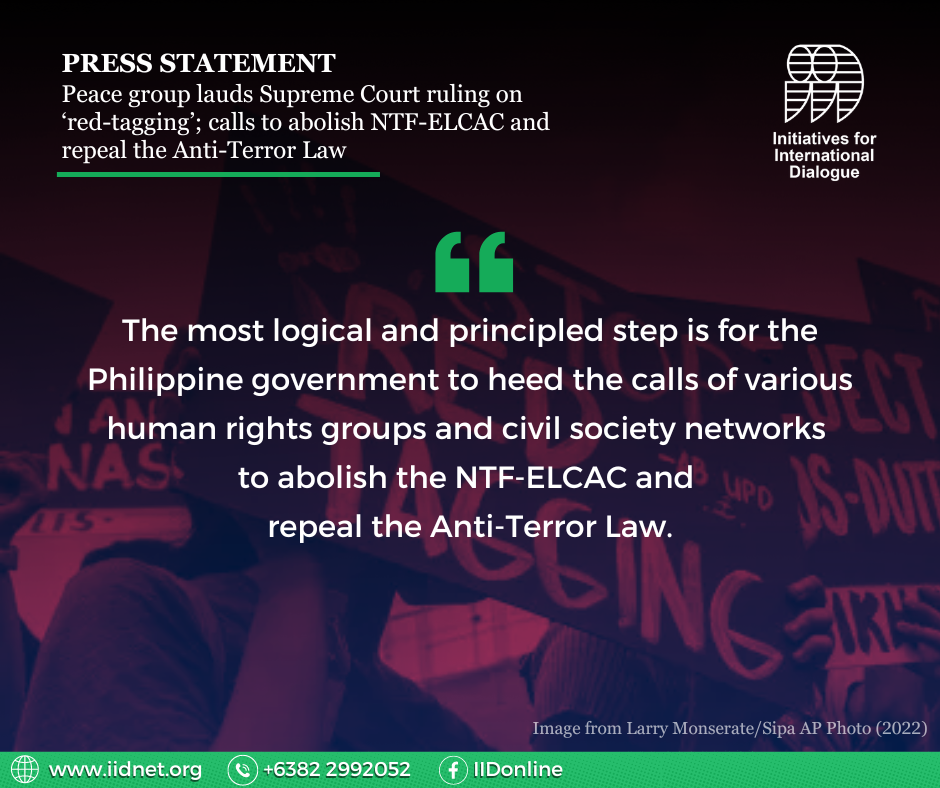
The Mindanao-based regional peacebuilding institution, Initiatives for International Dialogue (IID) working for human security, democratization and people-to-people dialogue in the Philippines and Southeast Asia, today welcomed the Supreme Court’s landmark decision on 08 May, finally defining ‘red-tagging’ a threat to people’s life, liberty, and security and joined calls to abolish the National Task Force to End Local Communist Armed Conflict (NTF-ELCAC) and repeal of the Anti -Terrorism Law 2020.
IID executive director Gus Miclat said, “We welcome the Supreme Court’s decision as a positive step towards strengthening the rule of law and protection of human rights in the country.”
Miclat added, “For the longest time, various Philippine administrations have been enacting draconian laws and policies that put at significant risk people’s lives, their fundamental freedoms and security. This sinister practice of red-tagging, in essence, is a license to kill anyone critical of the government.”
The IID executive director stressed, “This has to stop as it is not contributing to establishing a truly democratic society with accountable governance. We urge the Marcos, Jr. administration to publicly support the Supreme Court ruling and certify as urgent pending bills in the Senate and the House of Representatives against red-tagging.”
IID noted that the Philippine government has a long history of utilizing red-tagging or red-baiting in the guise of addressing armed insurgency especially during the time of late dictator Ferdinand Marcos Sr., father of the current President. The absence of a legal definition of red-tagging during this period has created monumental challenges especially for the whole human rights and peacebuilding community and prompted previous Philippine administrations to ‘weaponize’ existing laws to viciously attack legitimate dissent.
IID said that the practice of red-tagging has intensified during the previous administration that created the NTF-ELCAC through Executive Order 70, which has gained notoriety for red-tagging and profiling of political activists and known government critics.
In 2021, then Senator Franklin Drilon filed Senate Bill 2121 or the proposed “Act Defining and Penalizing Red-Tagging” which seeks to criminalize and punish red-tagging and provide for penalties as deterrence “in order to fix the legal gaps, address impunity and institutionalize a system of accountability.” Under the proposed measure, the crime of red-tagging is defined as the act of labeling, vilifying, branding, naming, accusing, harassing, persecuting, stereotyping, or caricaturing individuals, groups, or organizations as state enemies. There are also pending bills filed in Congress by the Makabayan bloc in 2021.
Abolish NTF-ELCAC and repeal Anti-Terror Law
Miclat explained, “Under the present condition, the most logical and principled step is for the Philippine government to heed the calls of various human rights groups and civil society networks to abolish the NTF-ELCAC and repeal the Anti-Terror Law.”
He pointed out, “Worse, these heavily securitized laws not only put the lives of those living in the communities at risk but will also jeopardize peacebuilding efforts in the country. The slogan of ‘UNITY’ of the present administration must be translated into a tangible programme of action of building unities with human rights and peacebuilding communities to effectively address the roots of insurgency and terrorism in the country.”
Miclat concluded, “While we commend the Philippine government and the National Democratic Front of the Philippines for agreeing to revive the peace talks in November last year, obviously there’s a lot more that needs to be done. The Philippine government must clearly address the underlying ‘drivers’ and roots of insurgency, terrorism and extremist violence. It could start with abolishing laws that breed injustice and armed-conflict and must direct its resources on supporting peacebuilding efforts of affected communities and promoting human rights protection and conflict prevention and transformation. The Supreme Court’s decision is providing the path for achieving this. ###
For inquiries: gani.abunda@iidnet.org

Recent Comments